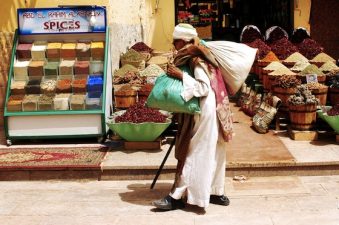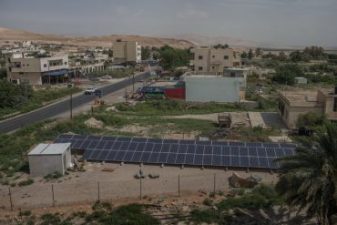 Supported by the women’s group Karama, families in Bethlehem’s Dheisheh refugee camp have begun growing fresh food on their rooftops
Supported by the women’s group Karama, families in Bethlehem’s Dheisheh refugee camp have begun growing fresh food on their rooftops
Cramped conditions in the Dheisheh refugee camp of Bethlehem mean that any space – nevermind green space – is difficult to come by. The streets are narrow, families live in small homes and parks and large gardens are unheard of. That, however, hasn’t stopped the women’s group Karama from making the most of the space they do have in the refugee camp to grow fresh produce the locals can enjoy. Thanks to the fundraising efforts of one of Karama’s friends in the US, the women’s organization has provided the stands, covering, water tank, soil and seeds, to develop micro-farms on the rooftop of 15 families. As I have written in the past, the flat roofs of Middle Eastern homes are great spaces that are often overlooked so it’s lovely to see them being put to green use in even the most difficult circumstances.
 “Although luxurious rooftop gardens might be a hype and trend in parts of the USA and Europe, these green havens created in Deheishe Refugee Camp are all but a hype: they are a necessity for the families,” explains the Karama Organisation on their website. “For many families in the refugee camp, budgets are small and when a choice has to be made, the first spending cuts are made in their purchase of fresh vegetables or fruits. This leaves these families on a very restricted diet, having a dramatic short- and long term effect on the physical and psychological health of the families, especially the children.”
“Although luxurious rooftop gardens might be a hype and trend in parts of the USA and Europe, these green havens created in Deheishe Refugee Camp are all but a hype: they are a necessity for the families,” explains the Karama Organisation on their website. “For many families in the refugee camp, budgets are small and when a choice has to be made, the first spending cuts are made in their purchase of fresh vegetables or fruits. This leaves these families on a very restricted diet, having a dramatic short- and long term effect on the physical and psychological health of the families, especially the children.”
According to UNRWA 40 per cent of Palestinian refugees in the West Bank are classified as “food-insecure” or vulnerable to food insecurity as they have limited access to agricultural lands. By providing the tools for the refugees to grow their own food in the camp, this urban agriculture initiative by Karama allows them to rely less on aid to feed their families.
 As well as addressing food insecurity in the West Bank, Karama (“dignity” in Arabic) also hopes that this project will have a positive impact on the role of women in society. Women have been put in charge of the gardens and have received training to ensure that the rooftop gardens are well looked after and maintained. Karama reason that, “working in the garden and supporting their families in this way, will help to release some of the stress they experience in their daily life, as well as empower them socially, increasing their self-esteem and life satisfaction.”
As well as addressing food insecurity in the West Bank, Karama (“dignity” in Arabic) also hopes that this project will have a positive impact on the role of women in society. Women have been put in charge of the gardens and have received training to ensure that the rooftop gardens are well looked after and maintained. Karama reason that, “working in the garden and supporting their families in this way, will help to release some of the stress they experience in their daily life, as well as empower them socially, increasing their self-esteem and life satisfaction.”
: Images via Karama Organisation.
For more on rooftop gardening in the Middle East see:
Rooftop Hydroponic Farms In Egypt Scrub the Air & Uplift Urban Poor
Beirut’s Rooftop Revolution (INTERVIEW)
What Urban Rooftop Gardening Could Do For The Middle East




This is a great idea – and notice that she uses drip irrigation to water the plants as well. This should be an example for others to use similar techniques where space is limited.